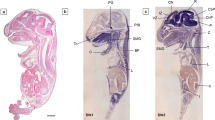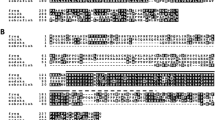Abstract
We have isolated and characterized the first Xenopus transmembrane Eph ligand, XLerk (Xenopus Ligand for Eph Receptor Tyrosine Kinases). While this ligand has 72% identity with the closest mammalian family member, Lerk-2, it is the cytoplasmic domain of this molecule that is the most conserved domain with 95% identity. XLerk exists as a maternally expressed mRNA, however, expression of transcripts and protein increase during gastrulation and again in the late swimming tadpole stage. In the adult, XLerk is expressed at low levels in most adult tissues with increased levels observed in the kidney, oocytes, ovary and testis. While low levels of XLerk expression are observed in the adult brain, in situ hybridization analysis demonstrates prominent expression in the developing olfactory system, retina, hindbrain, cranial ganglia, and somites. Furthermore, we have shown that XLerk transcripts are significantly elevated during mesoderm induction caused by activin and FGF, but not during noggin-induced neuralization. These results suggest a role for XLerk in the developing mesenchymal and nervous tissue.
Similar content being viewed by others
Author information
Authors and Affiliations
Rights and permissions
About this article
Cite this article
Jones, T., Karavanova, I., Chong, L. et al. Identification of XLerk, an Eph family ligand regulated during mesoderm induction and neurogenesis in Xenopus laevis. Oncogene 14, 2159–2166 (1997). https://doi.org/10.1038/sj.onc.1201082
Received:
Revised:
Accepted:
Issue Date:
DOI: https://doi.org/10.1038/sj.onc.1201082
- Springer Nature Limited
Keywords
This article is cited by
-
Mutagenesis and selection of PDZ domains that bind new protein targets
Nature Biotechnology (1999)




